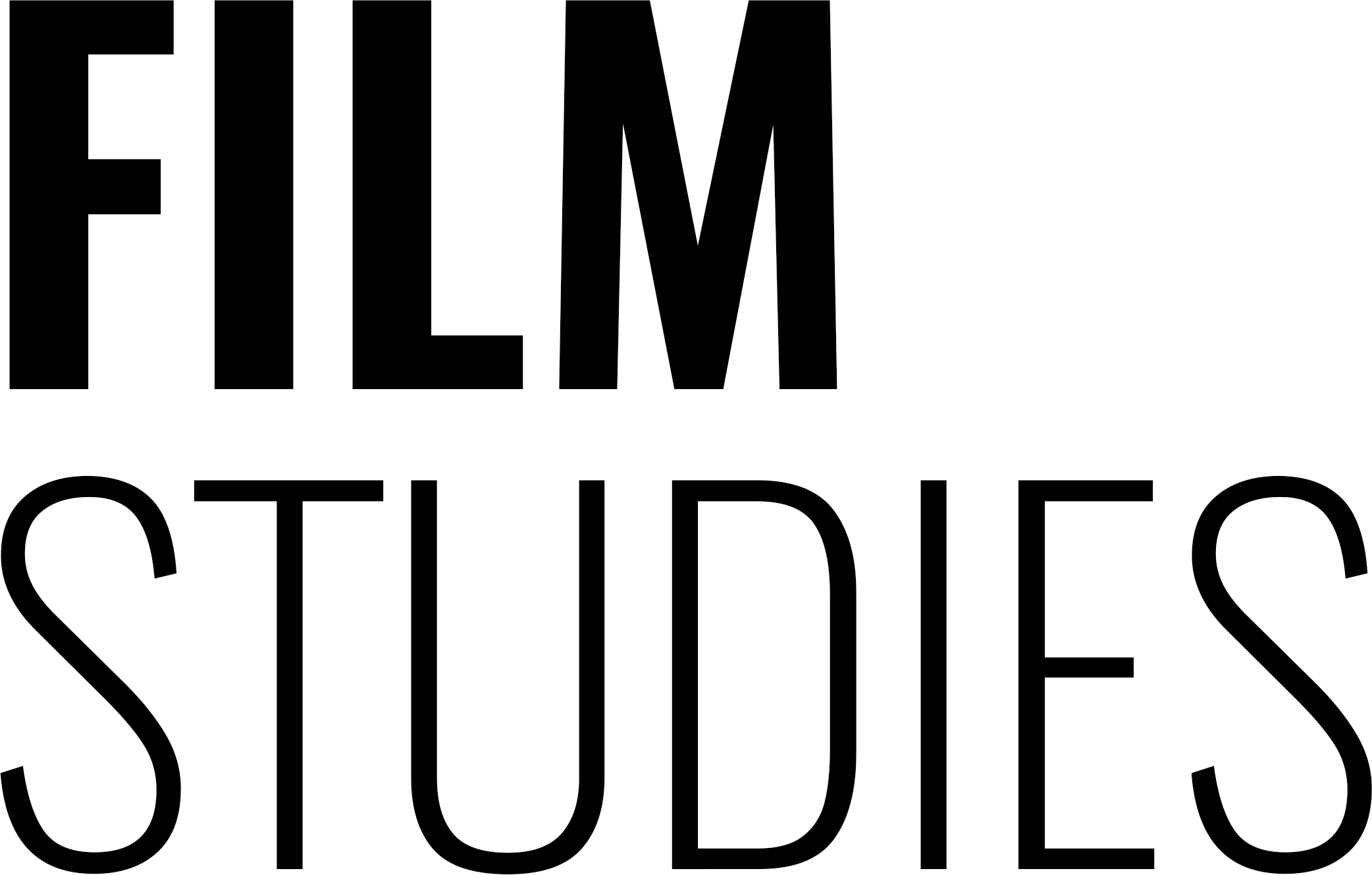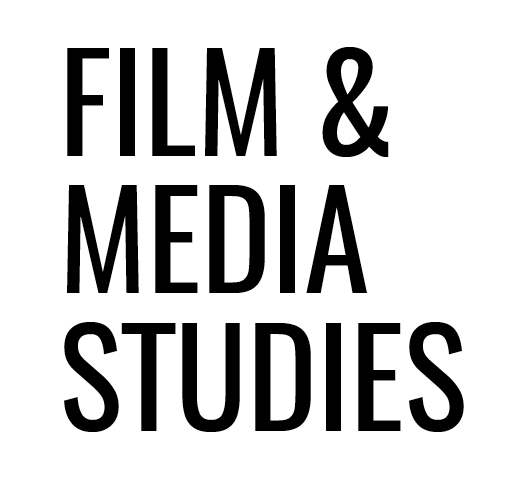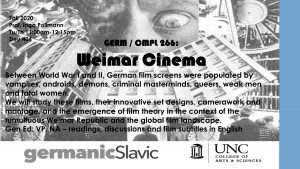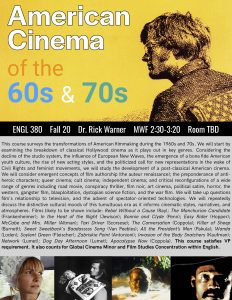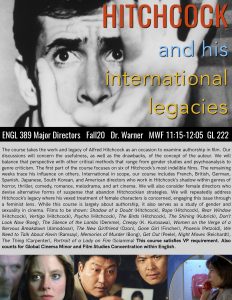Fall 20 Courses
Any course on this list (except for the First Year Seminars) may count as an elective for the Global Cinema Minor or the Film Studies concentration in English. Some of these courses, however, will not automatically count, and in those cases you will need to request a Tar Heel Tracker adjustment.
Also keep in mind that some restrictions may apply to production courses. Be sure to check Connect Carolina for specifications by the department offering the course.
Note that CMPL 143 History of Global Cinema will be offered again in Spring 21.
If you are following the Film Studies Major Concentration, here are Fall courses that will meet certain requirements:
Foundations
ENGL 142 Film Analysis (Dr. Flaxman)
Survey II
ENGL 380 Film History: American Cinema of the 1960s and 70s (Dr. Warner)
Writing Intensive
ENGL 380 Film History: American Cinema of the 1960s and 70s (Dr. Warner)
ENGL 389 Major Film Directors: Hitchcock and His International Legacies (Dr. Warner)
Research Intensive
CMPL/GERM 266: Weimar Cinema (Dr. Pollmann) **note that this will require a Tar Heel Tracker adjustment to count as research intensive; once the semester begins, contact Dr. Martin Johnson via email and he will take care of this for you.
Depth
CMPL 254 Horror and the Global Gothic (Dr. Rodriguez)
CMPL 262 Film and Politics: Screening Hate (Dr. Christmas)
ENGL 389 Major Film Directors (Dr. Warner)
***If you wish to plan ahead, here are ENGL and CMPL film courses currently planned for Spring 21. Several of these Spring 21 courses are new and their place within the concentration, in terms of category, is still being determined. Look for an update here soon.
CMPL 143 History of Global Cinema (Dr. Johnson), Survey I
CMPL 240 Introduction to Film Theory (Dr. Pollmann), Methods
CMPL 251 Film Performance and Stardom (Dr. Rodriguez)
CMPL 463 Cinema and Surrealism (Dr. Warner), Depth, Research-Intensive
ENGL 252 National and Transnational Cinemas: East Asian Crime Thrillers (Dr. Warner)
ENGL 257 Video Games and Narrative Cinema (Dr. Rodriguez)
ENGL 381 Literature and Cinema (Dr. Veggian), Survey II, Writing-Intensive
ENGL 494 Research Methods in Film Studies (Dr. Johnson), Research-Intensive
ENGL 681 Topics in Contemporary Film and Media (Dr. Flaxman)
First-Year Seminars
ASIA 72: First-Year Seminar: Transnational Korea: Literature, Film, and Popular Culture
TuTh 12:30pm-1:45pm
Hanes Art Center 215
Jonathan Kief
This first-year seminar introduces students to the history of transnational imaginations in modern Korea. Using literature, film, and television, it explores the ways in which Korean cultural producers have used narratives of transnational travel and exchange to rethink Korea’s place in the world and refashion the bounds of Korean identity.
ENGL 87: First-Year Seminar: Jane Austen, Then and Now
TuTh 9:30am-10:45am
Genome Sciences 1370
Inger Brodey
This course focuses on the fiction of Jane Austen and its representations in film.
RELI 70: First-Year Seminar: Jesus in Scholarship and Film
TuTh 9:30am-10:45am
Graham Memorial 38
Bart Ehrman
This seminar explores the ways the historical Jesus has been portrayed in the writings of modern scholars and films of the 20th and 21st centuries.
General Course List
AAAD 250: The African American in Motion Pictures: 1900 to the Present
Tu 3:30pm-6:20pm
Phillips 0383
Charlene Regester
This course will analyze the role of the African American in motion pictures, explore the development of stereotypical portrayals, and investigate the efforts of African American actors and actresses to overcome these portrayals.
ARTS 353: Phantasmagoria: Haunted Art, History, and Installation
MW 8am-10:45am
Hanes Art Center 226
Roxana Perez-Mendez
This course will be organized around four art making/art building projects, culminating in a class presentation of a multimedia phantasmagoria. Students will research early light/shadow, pre-cinema techniques, hauntings/horror and artists whose work is influenced by these tropes. We will work with Maker’s Spaces to produce components for this course. Previously offered as ARTS 253.
ASIA 231: Bollywood Cinema
TuTh 5pm-6:15pm / F 11:15am-12:05pm
Davie 112 / Dey 303A
Afroz Taj
This course explores the development of the Indian cinema, with particular emphasis on the Hindi-Urdu films produced in Mumbai (Bollywood).
ASIA 435: The Cinemas of the Middle East and North Africa
TBA
This course explores the social, cultural, political, and economic contexts in which films are made and exhibited and focuses on shared intra-regional cinematic trends pertaining to discourse, aesthetics, and production.
CHIN 346: History as Fiction or Fiction as History? Early Chinese History in Film and Literature
TuTh 12:30pm-1:45pm
New West 219
Uffe Bergeton
Through analysis of the role movies play in the formation of popular perceptions of the past, this course provides an introduction to the history of the Qin and Han dynasties.
CMPL 144: Engaging Film and Media: Independent Cinema and the American South
MW 1:25pm-2:15pm / F (various times)
Wilson 107
Martin Johnson
From Gone With the Wind (1939) to Forrest Gump (1994), Hollywood representations of the American South paint the region with the broadest of brushes, relying on stereotypes and mythologies of the region and its people. In this viewing-intensive class, we will explore films made outside of Hollywood that seek to represent the diversity and complexity of the contemporary South. We will also address the relationship between the American South and the global South, considering such issues as diasporic identities, migration, and transnational culture. Films to be screened or discussed include Eve’s Bayou (Lemmons, 2017); Beasts of the Southern Wild (Zeitlin, 2012); Mississippi Masala (Nair, 1991); Goodbye Solo (Bahrani, 2008); Selena (Nava, 1997); Hale County: This Morning, This Evening (Ross, 2018); Mudbound (Rees, 2017); Joe (Green, 2013); Waitress (Shelley, 2007); Daughters of the Dust (Dash, 1991); Bright Leaves (McElwee, 2003); Southern Comfort (Davis, 2001); and Moonlight (Jenkins, 2016).
This course satisfies the Visual & Performing Arts (VP) and Global Issues (GL) requirements. It also counts toward the Film & Media Studies Major within English, and toward the Global Cinema Minor.
CMPL/KOR/WGST 237: Rebel, Lover, Martyr: Gender and Sexuality in North and South Korean Screen Cultures
TuTh 3:30pm-4:45pm
New West 219
Jonathan Kief
This course introduces students to the history of North and South Korean film and television through the lens of gender and sexuality. In so doing, it explores the multiple forms of the Korean self and the diverse shapes that Korean identity has taken across the modern and contemporary eras.
CMPL 254: Horror and the Global Gothic: Film, Literature, Theory
TuTh 2:00pm-3:15pm
Greenlaw 301
Guillermo Rodriguez
This course traces the development of horror in film and writing from the 18th-century European novel to contemporary Asian film. Theoretical readings will embrace a range of disciplines, from literary and film theory to anthropology, feminism and gender studies, and psychoanalysis.
CMPL 262: Film and Politics: Screening Hate
TuTh 3:30pm-4:45pm
Greenlaw 317
Danielle Christmas
Although the political tenor of the moment has brought the normalization of white nationalist rhetoric into relief, Americans have always found creative ways to visualize the exclusion and eradication of the racial other. In this course, students will look at the arc of screen narratives that have inspired and defined contemporary hate movements in the United States. After establishing a shared critical language, we will examine films from D.W. Griffith’s cinematic celebration of the Klan in The Birth of a Nation (1915) all the way through a cross-section of recent YouTube “red-pill” videos, detouring into hate movement mainstream favorites like Fight Club (1999) and American Psycho (2000). We will read selected fiction that fills out these aesthetic politics, all with an eye towards understanding what aesthetics can tell us about hate politics, and how hate politics visualizes aesthetics. By the end of the semester, students will have the capacity to understand the place of this cinematic subculture within the larger body of contemporary American cultural production and the urgent discourses of race and violence that animate it. Students should have a high tolerance for disturbing content and a spirit of critical curiosity.
CMPL/GERM 266: Weimar Cinema
TuTh 11am-12:15am
Dey Hall 404
Inga Pollmann
Germany between World War I and World War II, during the period of the so-called Weimar Republic (1919-1933), was a politically, socially and economically unstable and dynamic time: the traumatizing experience of WWI, political unrest, hyperinflation, the modern woman, new technologies, the rise of the white collar class, urban development in Berlin and elsewhere, as well as the rise of fascism. Yet this is also a period of incredible cultural productivity in literature, painting, theater, and film. In this course, we will look at the major films produced in Weimar Germany—film still considered international milestones—and situate them in a larger cultural and aesthetic context. The films include Expressionist films such as The Cabinet of Doctor Caligari or Nosferatu, street films, city symphonies, science fiction films such as Metropolis, detective films, documentaries, and avant-garde films. We will ask how and why Germany developed such a unique film culture, and how the national context and the specter of fascism might help explain the film’s styles and narratives; but we will also expand our scope and look at film movements from France to Russia that influenced German cinema, as well as film cultures that appropriated and transformed Weimar cinema, such as Mexican or Chinese cinema. This class will provide you with a thorough knowledge of this crucial period of German film history and theory as well as the larger political and cultural context.
Gen Ed: VP, NA; discussions, readings and film subtitles in English.
COMM 230: Audio/Video/Film Production and Writing
MW 9:05am-11am
Global Center 3033
Edward Rankus
TuTh 2:35pm-4:25pm
TuTh 2:35pm-4:25pm
Murphey 220
Kristin Hondros
Prerequisites, COMM 130 and 140; Grade of C or better in COMM 130; permission of the instructor for students lacking the prerequisites. The material, processes, and procedures of audio, video, and film production; emphasis on the control of those elements of convention that define form in the appropriate medium. Lecture and laboratory hours.
COMM 330: Introduction to Writing for Film and Television
TuTh 11am-12:15pm
New East 305
Stephen Neigher
TuTh 2pm-3:15pm
Murphey 117
Stephen Neigher
An introduction to screenwriting for film and television.
COMM 331: Writing the Short Film
TuTh 11am-12:12pm
Murphey 221
Dana Coen
Students practice and learn the craft of narrative, short film writing by conceptualizing, outlining, writing, and rewriting three short film scripts. They include one three-minute silent, one five-minute script with dialogue, and one 15-minute script with dialogue.
COMM 334: Writing the One Hour TV Drama
TuTh 5pm-6pm
Murphey 117
Stephen Neigher
Prerequisite, COMM 330. Students in this class will live the life of a writing staff on a just-picked-up, fictional, one-hour television series. As if on a real series, they will individually and cooperatively create story ideas, treatments, and outlines, as well as write scenes, acts, and entire scripts.
COMM 335: Film Story Analysis
Th 5:35pm-8:35pm
Alumni 205
Dana Coen
A variety of feature films (both domestic and foreign) are screened in class and analyzed from a storytelling perspective. Emphasis is on the range of possibilities the screenwriter and film director face in the process of managing the audience’s emotional involvement in a story.
COMM 337: Visual Storytelling
MW 3:15pm-5:30pm / W 3:35pm-4:35pm
New East 201 / Hanes Art 121
Michael Acosta
Priority given to majors. This course instructs students on how to tell stories in a visual manner. How do the words on a page get translated onto a screen and how will the writer collaborate visually with a director? It is designed for writers to better understand how their scripts are interpreted and to improve visual writing.
COMM 430: History of American Screenwriting
MW 1:30pm-2:45pm / M 3:15pm-4:30pm
Stone Center 200
Michael Acosta
This viewing and research-intensive course examines the history of American narrative film through the screenwriter’s experience, using a decade-by-decade approach to examine the political, social, global, psychological, religious, and cultural influences on the art, process, and careers of screenwriters.
COMM 534: Aesthetic and Technical Considerations in Making Short Videos
MW 12:20pm-2:15pm
Murphey 221
William Brown
Prerequisite, COMM 230. The course examines the aesthetic and technical elements at work and play in cinematic storytelling. The student is required to complete three projects and will gain hands-on experience in narrative filmmaking.
COMM 635: Documentary Production
Tu 11am-12:15pm
Stone Center 200
Julia Haslett
Prerequisite, COMM 230. A workshop in the production of video and/or film nonfiction or documentary projects. The course will focus on narrative, representational, and aesthetic strategies of documentary production.
COMM 690: Environmental Filmmaking
T/Th 12:30–1:45 pm
Julia Haslett
A workshop to study and create non-fiction films about the environment. The course examines aesthetic, narrative, and representational strategies with an eye to how these films can contribute to critical conversations about our species’ impact on the natural world. Course work includes readings, written analysis, and the production of short video essays and documentaries. Screenings will feature international and US environmental films.
ENGL 142: Film Analysis
TuTh 2pm-3:15pm
Davie 112
Gregory Flaxman
This course offers an introduction to the technical, formal, and narrative elements of the cinema.
ENGL 143-001: Film and Culture
TuTh 2pm-3:15pm
Greenlaw 302
Bradley Hammer
Examines the ways culture shapes and is shaped by film. This course uses comparative methods to contrast films as historic or contemporary, mainstream or cutting-edge, in English or a foreign language, etc. Class Notes: Some seats in this section are reserved for first year students. Seats may appear open but will be restricted by the reserve capacity. Seats not used will be available on August 5.
ENGL 235: Studies in Jane Austen
TuTh 8am-9:15am
Greenlaw 222
James Thompson
Fulfills a major core requirement. This course focuses on both the novels of Jane Austen and their fate since publication in the early 19th century. They have inspired countless imitations, over 150 sequels and continuations, and more than 30 full-length films. We will trace the transmission and transformation of the original texts across time and cultures. Previously offered as ENGL 340.
ENGL 256: Crafting the Dramatic Film: Theory Meets Practice
TuTh 12:30pm-1:45pm
Hamilton Hall 425
Guillermo Rodriguez
This course places students behind the camera and in front of the screen as they alternate between creative and critical approaches to cinema. They learn how to practice the basic principles of narrative film production (producing, directing, cinematography, editing, and sound design) while engaging critically with key debates in film theory and criticism (semiotic, cognitive, psychoanalytic, feminist, and phenomenological).
ENGL 380: Film History: American Cinema of the 1960s and 1970s
MWF 2:30pm-3:20pm
Hamilton 517
Rick Warner
This course surveys the aesthetic, technological, and political transformations of American cinema during the 1960s and 70s. We will start by examining the breakdown of classical Hollywood cinema as it plays out in key genres. Considering a range of factors such as the decline of the studio system, the influence of European New Waves, the emergence of a bona fide American youth culture, the rise of new acting styles, and the politicized call for new representations in the wake of Civil Rights and feminist movements, we will study the development of a post-classical American cinema. We will consider emergent concepts of film authorship (the auteur renaissance); the preponderance of anti-heroic characters both male and female; queer cinema; cult cinema and the midnight movie phenomenon; independent and experimental films; and critical reconfigurations of a wide range of genres including road movie, conspiracy thriller, film noir, art cinema, political satire, horror, the western, gangster film, blaxploitation, dystopian science fiction, and the war film. We will take up questions of media change, namely film’s relationship to television, and the advent of spectator-oriented technologies. We will repeatedly discuss the distinctive cultural moods of this tumultuous era as they inform cinematic styles, narratives, and atmospheres. Films likely to be shown:
Rebel Without a Cause (Ray)
The Manchurian Candidate (Frankenheimer)
In the Heat of the Night (Jewison)
Bonnie and Clyde (Penn)
Easy Rider (Hopper)
McCabe and Mrs. Miller (Altman)
Taxi Driver (Scorsese)
The Conversation (Coppola)
Killer of Sheep (Burnett)
Sweet Sweetback’s Baadasssss Song (Van Peebles)
All the President’s Men (Pakula)
Wanda (Loden)
Soylent Green (Fleischer)
Zabriskie Point (Antonioni)
Invasion of the Body Snatchers (Kaufman)
Network (Lumet)
Dog Day Afternoon (Lumet)
Apocalypse Now (Coppola)
Counts for Global Cinema Minor and the Film Studies Concentration in English
This course satisfies the Visual & Performing Arts (VP) requirement.
ENGL 389: Major Film Directors: Hitchcock and His International Legacies
MWF 11:15am-12:05pm
Greenlaw 222
Rick Warner
The course explores the work and influence of Alfred Hitchcock, the master of suspense. The British-American filmmaker expanded the resources of his medium, experimenting with form and provocative subjects while straddling the boundary between popular entertainment and art cinema. We will take his output and legacy as an occasion to examine the concept of authorship in film. Our discussions will concern the usefulness, as well as the drawbacks, of the notion of the auteur. We will balance that perspective with other critical methods that range from gender studies and psychoanalysis to genre criticism. The first part of the course focuses on six of Hitchcock’s most indelible films. The remaining weeks trace his influence on later filmmakers. International in scope, our course includes French, British, German, Spanish, Japanese, South Korean, and American directors who work in Hitchcock’s shadow within genres of horror, thriller, comedy, romance, melodrama, and art cinema. We will also consider female directors who devise alternative forms of suspense that abandon Hitchcockian strategies. We will repeatedly address Hitchcock’s legacy where his vexed treatment of female characters is concerned, engaging this issue through a feminist lens. While this course is largely about authorship, it also serves as a study of gender and sexuality in cinema. Films to be shown:
Shadow of a Doubt (Hitchcock)
Rope (Hitchcock)
Rear Window (Hitchcock)
Vertigo (Hitchcock)
Psycho (Hitchcock)
The Birds (Hitchcock)
The Shining (Kubrick)
Don’t Look Now (Roeg)
The Silence of the Lambs (Demme)
Creepy (K. Kurosawa)
Women on the Verge of a Nervous Breakdown (Almodovar)
The New Girlfriend (Ozon)
Gone Girl (Fincher)
Phoenix (Petzold)
We Need to Talk About Kevin (Ramsay)
Memories of Murder (Bong)
Get Out (Peele)
Night Moves (Reichardt)
The Thing (Carpenter)
Portrait of a Lady on Fire (Sciamma)
Counts for Global Cinema Minor and the Film Studies Concentration in English
This course satisfies the Visual & Performing Arts (VP) requirement
ITAL 333: Italian Film and Culture
TuTh 2pm-3:15pm / Tu 3:30pm-4:45pm
Dey 204
Analysis of films from World War II to the present. Lectures and discussion in English. Films in Italian with English subtitles. Readings in Italian for majors, in translation for nonmajors.
JAPN 375: The Culture of Modern, Imperial Japan, 1900-1945
TBA
This course will examine the various expressions of cultural modernity in Japan with a focus on film, literature, and popular culture from 1900 to the end of the Pacific War.
RUSS 280: Russian Villains, Western Screens: Ethno-Cultural Stereotypes on Page and Stage, in Movies and Minds
MW 1:25pm-2:15pm / F (various times)
Dey 305
Stanislav Shvabrin
A survey of fascinating history of Hollywood stereotypes of Russian villainy from Elizabethan England to Boris Badenov, Natasha Fatale, Ivan Drago, and Xenia Onnatop. What do these theatrical buffoons, cartoon-movie monsters, and cinematic seductresses tell us about Russia — and about ourselves as consumers of stereotypes? Readings and discussions in English.
WGST 345: Gender and Film
MWF 10:10am-11am
Peabody 216
China Medel
This course examines the representations of women in contemporary American film and also considers women as producers of film.
